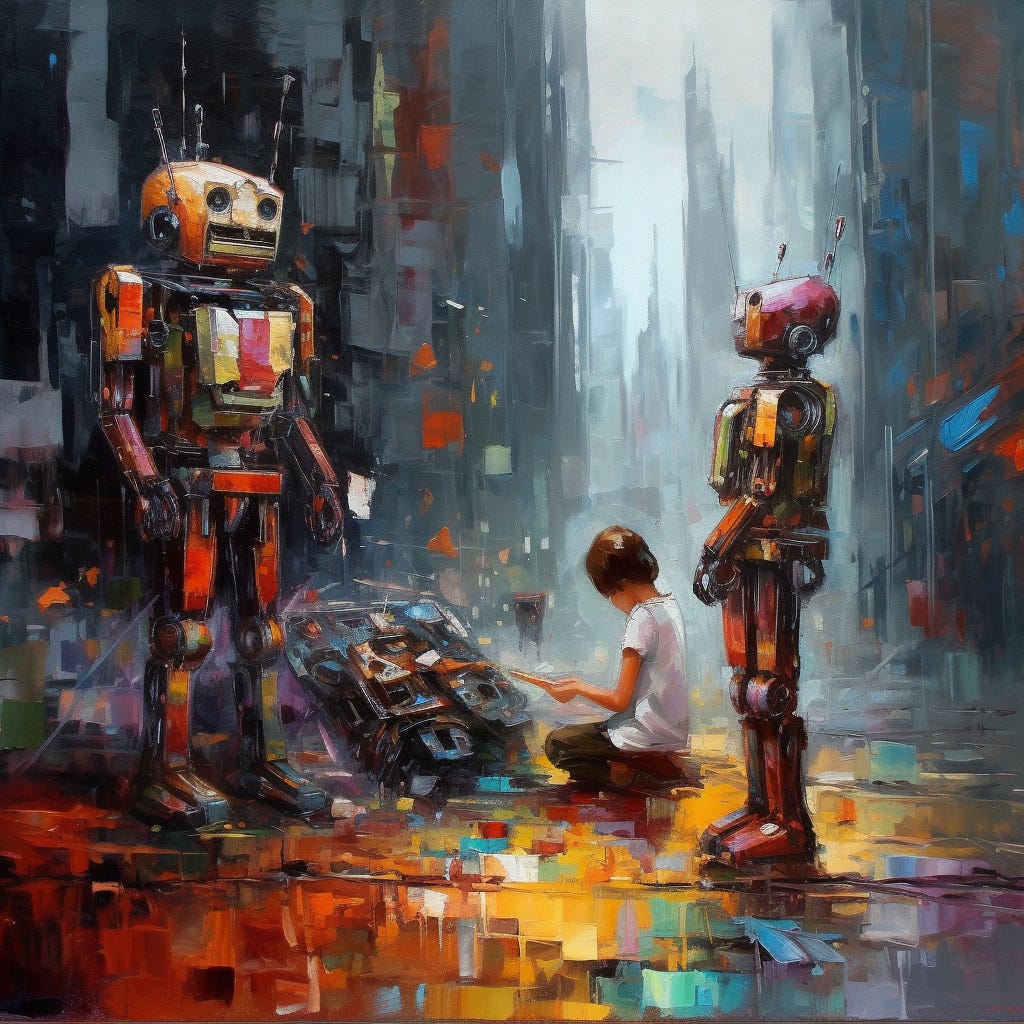Beyond Words: The Dance of Language, Intuition, and AI
Navigating the Nuances of Communication, Consciousness, and Computation
The Symphony of Human Expression: Language as Our Unique Melody
In the vast orchestra of life, every species plays its own tune. Birds chirp, wolves howl, and dolphins whistle. But humans? We've composed a symphony of cognitive language communication. This isn't just about sharing our day-to-day experiences or fleeting emotions. Language is our bridge to the abstract, the past, and the yet-to-be-imagined futures. It's the quill with which we've penned epics, the voice that has declared laws, and the whisper that has passed down age-old tales by the fireside. Through words, whether inked or spoken, we've birthed entire realms of philosophy, science, and art. We've built societies on the bedrock of discourse and, at times, watched them crumble by the same force.
Yet, there's a profound intimacy in how language shapes our very identity. Within the silent theaters of our minds, an unending dialogue plays out, sculpting our sense of self. It transforms fleeting sensations into tangible thoughts, giving form to our beliefs and aspirations. Imagine a world without words; our existence would be a blur of raw emotions and primal instincts, much like the creatures we share this planet with. Language is our evolutionary leap, propelling us from mere sensation to profound cognition.
However, this gift is a double-edged sword. As we ascend the tower of articulate thought, we often leave behind the intuitive whispers of our primal selves. Those "gut feelings" are overshadowed by the loud chatter of our logical minds. We risk becoming prisoners to our own neurotic thoughts, forgetting that language, at its best, is a tool for enlightenment, not entrapment. It's crucial to remember that while language gives us wings to soar into the realms of higher-order thinking, it shouldn't sever our roots to the earthy instincts that ground us.
The Linguistic Metaverse: How Words Shape Our Reality
While the term "metaverse" is not traditionally used to describe language, there are some compelling parallels between the two:
Shared Space for Interaction: Just as a digital metaverse provides a shared space for users to interact, language offers a shared medium for humans to communicate, share ideas, and build relationships.
Abstraction and Representation: Both language and a metaverse represent abstracted versions of reality. Words are symbols that represent objects, emotions, ideas, and more. Similarly, a digital metaverse is an abstracted, often symbolic representation of some aspects of the physical world or imagined realities.
Evolution and Expansion: Both language and the idea of a metaverse evolve and expand over time. As cultures grow, change, and intermingle, languages adapt, incorporating new words and concepts. Similarly, as technology advances, the digital metaverse will likely expand and evolve.
Constructing Realities: Language allows us to construct narratives, stories, and entire worlds in the minds of listeners or readers. In a similar vein, a metaverse allows for the construction of digital realms and experiences.
Access to New Dimensions: Just as a metaverse might offer access to new digital dimensions or experiences beyond our physical reality, language allows us to explore realms of thought, emotion, and imagination that would be otherwise inaccessible.
Cultural and Social Impacts: Both language and the concept of a metaverse have profound impacts on culture and society. Language shapes thought, identity, and community. Similarly, as digital metaverses become more integrated into daily life, they too will shape cultural norms, behaviors, and identities.
While the analogy isn't perfect, and the term "metaverse" has specific connotations in the realm of digital technology, one could poetically argue that language is a kind of original metaverse—a shared, evolving space of abstraction and representation that allows humans to connect, communicate, and construct realities.
Silent Wisdom: When Intuition Speaks Louder Than Words
Consider the term "muscle memory." Athletes and performers know it well, a kind of embodied knowledge that bypasses conscious thought. But what about our intuitive muscle memory, especially when it comes to deciphering the world's complexities? Our profound reliance on language often blinds us to this silent wisdom. We're so entrenched in the belief that everything must be named, categorized, and explained that we'll even invent new words when our lexicon falls short. But sometimes, words can't capture the full essence of our understanding.
Take the intriguing tale from Malcolm Gladwell's "Blink" involving the J. Paul Getty Museum's acquisition of a supposedly ancient marble statue in 1983. To the untrained eye, it was a magnificent relic. Yet, to certain art connoisseurs, something was amiss. It wasn't a matter of detailed analysis or scholarly debate; it was an immediate, visceral reaction. One historian felt it "didn't look right." Another expert, after a mere glance, warned the museum's board against the purchase, guided by an unshakable gut feeling. As it later emerged, their instincts were spot on. The statue's authenticity documents were fabrications, and the dealer's credibility crumbled.
But here's the catch: when these experts tried to articulate their doubts, they grappled with their own instincts. Language, in its quest for precision and clarity, sometimes muddies the waters of intuition. It can lead us astray, making us second-guess the very insights that, deep down, we know to be true. This tale serves as a poignant reminder that while language is a powerful tool, it's not the only one in our cognitive arsenal. Sometimes, silent wisdom speaks the loudest.
AI and the Unspoken: Navigating the Intuitive Frontier of Machines
In a world that seeks clarity, we often find solace in explanations. "Trust your intuition," they say, but deep down, we yearn for the reassurance of reason. This need for linguistic validation becomes even more pronounced when the stakes are high. In the realm of language, there's an inherent promise of a 'right' answer, a definitive conclusion.
Imagine then, a machine scanning an x-ray and suggesting a high probability of cancer. Our immediate response? "Why?" We're conditioned to seek explanations, especially when faced with life-altering decisions. But what if, akin to the enigmatic Getty statue, the machine's rationale isn't immediately discernible? What if there's no neat, logical sequence of "if this, then that" to justify its conclusion? For seasoned coders and tech aficionados, this departure from traditional logic can be unsettling. Machines, after all, were once strictly bound by the deterministic rules we set for them.
Yet, the dawn of neural network simulations has ushered in a paradigm shift. These artificial "brains," once blank canvases, are now brimming with knowledge, drawing upon a kind of digital intuition. Unlike humans, they don't wrestle with the linguistic need to rationalize every decision. They simply "know."
As the world anticipates the emergence of AGI (artificial general intelligence), a concept still nestled within the pages of sci-fi, we mustn't overlook the marvel we've already birthed. This AI evolution not only paves the way for deeper external discoveries but also beckons us to introspect, to reconnect with the intuitive facets of our being that language might have overshadowed over time.
Jim Brickman's "Simple Things" beautifully captures this sentiment. Sometimes, things just "are," be they simple or profoundly complex. In our quest for understanding, perhaps we should learn to embrace both the spoken and the unspoken, the logical and the intuitive.
The first leaves off the tree
The way you look at me
A thousand chiming church bells ring
The simple things are free
The sun, the moon, the stars
The beating of two hearts
How I love the simple things
The simple things just are
In the grand fabric of existence, humans have always sought to find their voice, to articulate the inexpressible. From the harmonious symphonies of our shared stories to the vast metaverse constructed by our words, language has been our compass, guiding us through the labyrinth of life. Yet, amidst the cacophony of articulated thoughts, there lies a silent wisdom, a gentle reminder that not all truths wear the cloak of words. As we stand on the precipice of a new era, where machines echo our intuitive prowess, we're reminded of the delicate balance between the spoken and the unspoken. It beckons us to listen closely, not just to the world around us, but to the silent symphony within, where intuition and understanding play their timeless tune. As we navigate this evolving landscape, may we cherish both the melodies of language and the silent whispers of the heart, recognizing that together, they compose the profound song of humanity.
.








